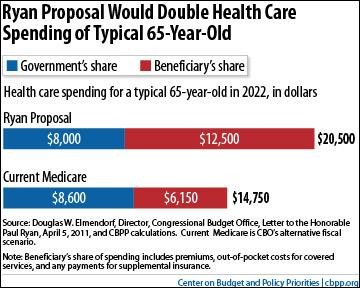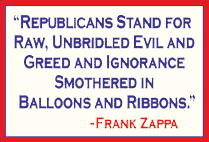This isn’t a serious proposal; it’s a strange combination of cruelty and insanely wishful thinking.
- Paul Krugman
 It was with some amusement (and no small amount of quashing my desire to throw objects at my television) that I watched Paul Ryan’s
It was with some amusement (and no small amount of quashing my desire to throw objects at my television) that I watched Paul Ryan’s dog-and-pony show unveiling of his draconian budget. It didn’t take long for those who know about these things (like Paul Kurgman) to decimate the assumptions on which Ryan built his house of cards. I have little doubt that Ryan and his minions toiled long hours in trying to craft a budget that they felt they could balance AND sell to their (rabid Tea Party) base. It just would have been nice if this budget didn’t represent war declared on the American middle class.
An interested observer could have been faulted for being immediately suspicious when Ryan laid out the case that, if we would only just believe in him and follow his budget, unemployment would magically decline to…wait for it…2.8%. In what seems somewhat akin to hunting for unicorns, Ryan’s budget is built on the soft sand of assuming that tax cuts will spur job growth. This may be conventional and predictable Right-wing dogma, but if there’s evidence to back up Ryan’s assumption, I haven’t been able to find it.
The Heritage Foundation’s analysis predicts that, under Ryan’s budget, unemployment will drop to 2.8% by 2021. Except that when someone at the Heritage Foundation figured out such a prediction was nothing if not fantastical, they released a new version of the analysis, which magically disappeared the unemployment rate prediction. Heritage’s new analysis, while less fantastical and laughable, still doesn’t hold up to anything resembling serious scrutiny. In short, it just doesn’t make sense.
Made-up numbers are in the end still made-up numbers.
Here’s what the progressive rebuttal should be in a nutshell: 1) point out that voodoo economics is back in full gear; 2) start talking about tax reform and its potential to produce a fairer, simpler, and more pro-growth system that has the added advantage of plugging a big hole in the budget; 3) instead of worrying about protections for the elderly, many of whom are quite affluent, remind people that, whether young or old, wealthy Americans have made out like bandits in recent decades and that it’s time to do something for working families of modest means; 4) rethink America’s defense posture and whether we can continue to be the world’s policeman, and 5) be open to some reforms to Medicare and Medicaid but only if they’re combined with additional revenues and a more streamlined military.
 Voodoo economics…so that’s what this is all about? Listening to Ryan’s presentation, it was clear that this is every bit as much about ideology as it is about how we pay for government. It’s about cutting, changing, and decimating government in ways that are anathema to Democrats. Ryan’s budget isn’t about trying to do the right thing by the American people; it’s about winners and losers. It’s about trying to create a country tailored to the needs and demands of the wealthy and well-off. It’s about tilting the balance of power away from unions and the middle-class and moving it to corporate interests, who, after all, are the GOP’s primary constituency and benefactors.
Voodoo economics…so that’s what this is all about? Listening to Ryan’s presentation, it was clear that this is every bit as much about ideology as it is about how we pay for government. It’s about cutting, changing, and decimating government in ways that are anathema to Democrats. Ryan’s budget isn’t about trying to do the right thing by the American people; it’s about winners and losers. It’s about trying to create a country tailored to the needs and demands of the wealthy and well-off. It’s about tilting the balance of power away from unions and the middle-class and moving it to corporate interests, who, after all, are the GOP’s primary constituency and benefactors.
Ryan’s budget seeks to create an America which works well for those who have, but leaves crumbs for the vast majority of Americans not fortunate enough to be in the top 2% of income earners. The philosophy driving Ryan’s assumptions seems to be, “We got ours; you can damned well get your own.”
There’s one very big truth that no one in Washington- especially Ryan and his fellow ideologues- seems willing to acknowledge. If serious, concerted effort was expended in an effort to reduce unemployment, the deficit would shrink. Employed people pay taxes and use government services. Unemployed people pay no taxes and consume far more government services. So, increase employment…and the deficit problem eventually gets solved. Brilliant, huh? So why aren’t more politicians- on both sides of the ideological divide- focusing on unemployment like a laser beam?
It was all about jobs during the 2010 election campaign. Now that Republicans have a majority in the House, they’ve reverted to type, fighting the culture wars. They’ve declared war on women, health care reform, the middle class, and unions, just to name a few. Jobs? Yeah…that was then; this is now….and now we need to get rid of the ridiculous notion that women can be trusted to be in control of their reproductive functions.
Ryan’s budget cuts taxes and changes the regulatory environment in ways that benefits the wealthiest interests. It guts Medicaid and Medicare, programs which benefit large numbers of middle-class and lower-income Americans. It would repeal the Affordable Health Care act, which would leave 32 million Americans without health insurance. In terms of health care, it would create two Americas- one with access to quality, affordable health care, and another left to fend for themselves and suffer the consequences.
So much for the Social Contract….
In order to arrive at his budget, Ryan has had to depend on what Paul Krugman calls “unicorn sightings”, or what you and I might call belief in the impossible. While any budget is building on models and assumptions, Ryan’s magnum opus seems to have taken unicorn hunting to new, fantastical heights. If adopted in the form it currently exists in, Ryan’s budget will very likely become a case study for the law of unintended consequences. Is that the America we want?
Republicans are right to attempt to put the focus on the national frustration with government. It’s bloated, it’s inefficient, and we need to have a national conversation about what we want and what we believe government should look like. The reality, though, is that, piss and moan though we may, Americans value their government. Despite the Far Right’s reliance on the Reaganism that “Government isn’t the solution, government is the problem”, Americans by and large understand the need for government. We can, will, and generally do disagree about what that government should look like…but Americans don’t hold with Grover Norquist’s desire to shrink government to a size where it can be drowned in a bathtub.
This is not a budget; it’s Paul Ryan’s roadmap for dragging this country to the poorhouse. Ultimately, it will do little to reduce the deficit, because spending cuts will go to finance tax cuts…and guess who will benefit the most from those tax cuts? If you said the poor and middle class, you clearly haven’t been paying attention.
Now that Ryan has put his cards on the table and made clear his disdain for Americans who aren’t wealthy, those of us the Left have the ammunition we need to expose this fraud for what it is. The question, of course, is whether or not Democrats will be able to unite behind a single message and convince Americans that Ryan’s budget, along with the GOP’s culture wars, are bad for the country. Recent history being what it is, confidence is tough to come by…but I don’t think it’s a stretch to say that the future of our country hangs in the balance.
What do we want this country to look like? What do we want government to look like? It’s a long-overdue conversation, but we’ve clearly reached a tipping point where hard decisions need to be made. None of us will get everything we want, but we do need to figure out what kind of country we want to be…and we need to make those decision based on facts and truth…NOT unicorn sightings.
The clock’s ticking, y’all….
